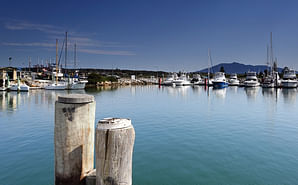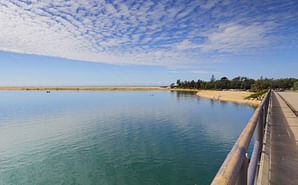Reuse
Some frequently asked questions and answers.

Questions and Answers
- Treated wastewater is either reused for irrigation or disposed of. Council reuses as much of it as possible for irrigation at Pambula Merimbula Golf Course and farmland at Oaklands. The remainder is disposed via the beach-face outfall or dunal exfiltration ponds. We are also investigating the possibility of re-using effluent for irrigation at the Pambula Sporting Complex
- Yes, we currently have 11 re-use schemes operating in the shire. The total amount of re-use fluctuates according to the weather. In financial year 2019/20, we beneficially re-used 40% of our effluent, which is far more than the state average of 13.4%. Also in that same year we recycled a higher percentage of effluent than any other coastal council in NSW.
- The golf club uses between 13% and 30% of the total volume of treated wastewater produced at Merimbula STP each year. More is used in dry years, less in wet. Median use is around 21% per year.
- Pambula Merimbula Golf Club has been using treated wastewater from Merimbula STP for 46 years.
- Oaklands Farm uses between 5% and 11% of the total volume of treated wastewater produced at Merimbula STP each year. More is used in dry years, less in wet. Median use is around 8% per year.
- Oaklands’ treated wastewater use scheme has been operating since February 2013. Treated wastewater is pumped through a 4km pipeline to a 20 million litre storage dam located on the Oaklands property.
- The Merimbula landscape is unique and there are constraints on where we can direct recycled water to; we must protect existing wetlands, endangered ecological communities, National Park areas, oyster leases and Aboriginal heritage sites.
- Land for reuse of recycled water typically needs to have suitable buffer zones from waterways, a slope less than 10 degrees and a suitable soil profile. It also needs to enable irrigation infrastructure that can be programmed to apply water when the vegetation requires it and operated to avoid overspray, spray drift, runoff, ponding and water-logging of soils.
- There are about 7 hectares of sports fields at the Pambula Sporting Complex that could benefit from water reuse. We are working on estimates for cost and reuse volume. There is a lot to think about when planning a new reuse scheme and Council has committed to developing a Recycled Water Management Project for the entire Shire.
- The Recycled Water Management Project will take a shire-wide approach to effluent recycling, looking at opportunities that can be planned for, costed and implemented strategically.
- The project will steer us away from an ad-hoc approach, focussing instead on creating a framework for delivering an overall increase in effluent re-use.
- Taking this approach will allow us to focus on locations better suited to large-scale effluent reuse, while identifying smaller opportunities in areas such as Pambula and Merimbula, where more barriers such as land use and geology exist.
- Community feedback is being processed from the recent water and sewer services survey, and the community will be consulted as part of the Recycled Water Management Project on what they are willing to pay to for Council to deliver increased re-use.
- Current concentration of phosphorus in the treated wastewater is about 9 milligrams per litre (mg/L). This has been a limiting factor for new treated wastewater use options.
- Current concentration of nitrogen in the treated wastewater is about 4 milligrams per litre (mg/L).
- When sewage is treated the organic solids are separated from the treated wastewater and matured in lagoons for around six months.
- The process is similar to a compost pile. The result is nutrient rich organic material called biosolids.
- Biosolids are stabilised and then supplied to local farms as a nutrient rich organic soil conditioner.
- Merimbula STP generates beneficial biosolids from all over the Shire. Biosolids from Cobargo, Wolumla, Candelo, Kalaru, Merimbula and Pambula are all processed at Merimbula STP.
- Before 2019 all the annual generation of 6,000 t/year of biosolids went to landfill. We now target 100% of that to be diverted to our contractor Arkwood to use on local farms. Whatever can not be re-used is reprocessed and used on-site at our sewage treatment plants. Almost all of our biosolids will now avoid landfill, and most will benefit local farmers.
- The exfiltration ponds were commissioned in 1991.






